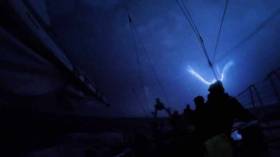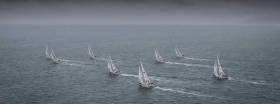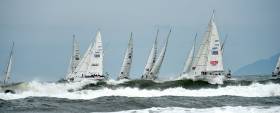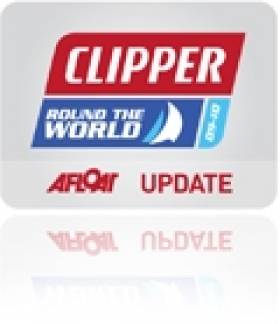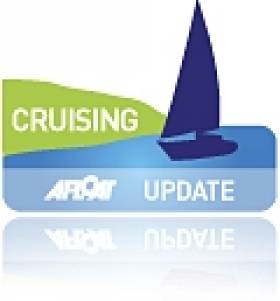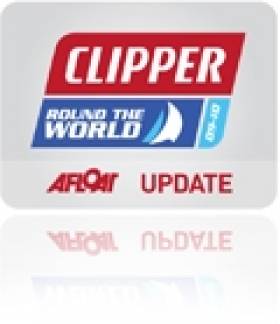Displaying items by tag: Clipper Round The World Yacht Race
Chinese sailing teams from the cities of Qingdao and Zhuhai grabbed the top two spots in the seventh stage of the Clipper Round the World Yacht Race. The nail-biting race, stretching over a marathon of 4,000 nautical miles from Airlie Beach, Australia, to Ha Long Bay, Vietnam, saw the Qingdao team emerge victorious in the end.
The team had a tight grip on the first position for the last week of the race, but as they approached the finish line, the wind slowed down, and their competitors, the Zhuhai team, began closing in. A narrow finish line and better winds for the boats to the east and west meant that the Qingdao team had to work even harder to maintain their lead, which they did successfully.
The Qingdao team's skipper, Philip Quinn, said that it was a nerve-wracking night as they did not know where their competitors were, but they managed to pull off a win against some great competition. The team from Zhuhai crossed the finish line just 40 minutes behind Qingdao, having made a bold move of heading further west to find stronger winds, which paid off.
This was an impressive achievement for the Qingdao team, which celebrated its first podium of the 2023-24 edition. It was also a debut race for the skipper and the first mate duo, who managed to steer their team to a win.
While the Robin Knox-Johnston-led Clipper Fleet Round the World Race organisation is a remarkably effective body, even its most experienced executives can only give a ball-park figure as to when the leading boats are going to complete a transoceanic leg.
As already reported in Afloat.ie, the most recent stage from Bermuda to Derry/Londonderry saw the winning Bermuda boat (and other front runners) get in rather earlier than expected, as the nine-day Foyle Maritime Festival - which doesn't officially start until tomorrow, Wednesday, July 20th - was still in process of assembly.
 Racing to Derry - had driving aboard WTC Logistic during the Transatlantic leg from Bermuda
Racing to Derry - had driving aboard WTC Logistic during the Transatlantic leg from Bermuda
In the middle of all that, on July 24th, the Clipper fleet will take their departure for the final leg to London in their pandemic-interrupted 2020-2021 World-Girdling Race. The complex Clipper
operation is now on such a scale that it has become a sort of parallel sailing universe, best glimpsed through their own high-powered communications system
 The Clipper Fleet will be in Foyle Marina in Derry/Londonderry until July 24th
The Clipper Fleet will be in Foyle Marina in Derry/Londonderry until July 24th
Lightning Storm Captured as Clipper Race Approaches Punta Del Este
After a hard-fought and challenging 5,200 nautical miles across the Atlantic, the Clipper Race fleet faced one more hurdle in the last 48 hours as they started to get closer to Punta del Este, Uruguay.
The notorious Pampero wind is a meteorological phenomenon commonly found around the lowlands of Brazil, Argentina and Uruguay. This burst of cold polar air can be violent and picks up very quickly. The Clipper Race fleet experienced this natural force as they raced down the coast.
Commentary: First Mate (AQP) on board Punta del Este, Ryan Barkley
Strange cigar shaped cloud formations, known as roll clouds, appeared ominously and the crews set to work quickly reducing sail and preparing for the inevitable. In the case of the Punta del Este team, the winds hit hard and gusts of up to nearly 80 knots were felt on deck. A Code 2 Spinnaker is certainly not designed for anything like those conditions and as the crew battled furiously to take it down, nature did its thing and decided it would come down but in many more pieces than it went up in.
The crew’s experience and skill meant that up against the elements, they dealt with the situation extremely well and were back racing along very quickly to an outstanding and warm Latin American welcome as they arrived at the Yacht Club Punta del Este.
Clipper Race Fatality in the Southern Ocean
Clipper Round the World Race organisers are reporting the fatality of Simon Speirs, a crew member on board CV30, (GREAT Britain).
Simon, 60, from Bristol, UK, was on the foredeck assisting with a headsail change from Yankee 3 when he was washed overboard. Although he was clipped on with his safety tether, he became separated from the yacht in the Southern Ocean at approximately 0814UTC (1414 local time) in a rough sea state, in 20 knots of wind, gusting 40.
The team’s man overboard recovery training kicked into immediate effect and despite the rough conditions, Simon was recovered back on board by the Skipper and crew within 36 minutes, at which point CPR was immediately administered by three medically trained crew, which included a GP. However Simon sadly never regained consciousness and was pronounced deceased at 0925UTC. The cause of death is unconfirmed at this time but thought to be by drowning.
All other crew are reported safe and are being supported remotely by the Race Office.
The incident occurred on Day 18 in Race 3 of the 13 stage Clipper Race. The fleet was racing from South Africa, Australia. The yacht, which was in sixth place, currently has approximately 1,500 miles left to its destination.
At the time of the incident, Simon was clipped on, wearing his lifejacket, which included an AIS beacon, as well as approved waterproof ocean oilskins. A full investigation will now be carried out, as is standard practice, into the full details of the incident, including the reasons his safety tether did not keep him on board, in cooperation with the appropriate authorities.
A member of the crew since Race Start in the UK on August 20, 2017, Simon was a highly experienced sailor with over 40 years dinghy experience and a Coastal Skipper licence.
He also successfully completed the Clipper Race Coxswain Certificate (CRCC) in February this year in anticipation of his challenge. Designed in collaboration with the Maritime Coastguard Agency (MCA), and the Royal Yachting Association (RYA) specifically for the Clipper Race, this involved an intensive two-week course, in addition to the four weeks of compulsory training that all Clipper Race crew must complete which concentrates on safety at sea.
All Clipper Race crew, regardless of previous sailing experience, complete a compulsory and intensive four-week training programme before joining the race which covers all aspects of safety at sea, including repeated man overboard training drills, which are also repeated in race stopovers.
Simon’s next of kin have been informed and our deepest thoughts are with his family and all those who knew him.
The yacht is currently making best speed to Fremantle, Australia and we’ll provide further updates as we have them.
British sailing legends are lining up to offer their congratulations to yachting legend Sir Robin Knox-Johnston and his team at the Clipper Round the World Yacht Race who are celebrating 20 years this weekend since the first race set sail and opened up the challenge of ocean racing to every-day people seeking a global adventure.
Sir Robin Knox-Johnston, 77, the first man to sail, solo, non-stop around the world in 1968-69, established the Clipper Race, along with CEO William Ward, to allow anyone, regardless of previous sailing experience, the chance to embrace the thrill of ocean racing.
Sir Robin said: “I have always believed strongly that we only have one life and should live it as fully and as adventurously as possible. Twenty years ago we took a chance and started this idea of training amateur sailors to achieve the incredibly life-affirming challenge of circumnavigation, and I’ve been incredibly proud to see the race grow in popularity in each edition.”
The biennial Clipper Race has just completed its tenth edition and is regarded as one of the world’s toughest endurance challenges. Over the past two decades more than 4,000 amateur sailors have competed in the marathon race and the fleet has amassed a cumulative distance in excess of 3.8 million nautical miles.
The third generation fleet of twelve identical 70-foot yachts combined with 700 crew over the 40,000 nautical mile course makes it the biggest ocean race on the planet. It takes almost a year to complete a series of 14 races between six continents.
Dee Caffari MBE, a former Clipper Race training skipper and the first woman to sail single-handedly and non-stop around the world westward, against the prevailing winds and currents, said: “The Clipper Race has given so many people the opportunity to endure the harsh remoteness of the oceans, experience nature in its true environment and excel in the pure, thrilling exhilaration of our sport.
“We will forever be united by our voyage of discovery, our experience of extremes and we will always have each other’s backs, because we have become a very special family. Thank you to Sir Robin and a pat on the back to all those who have now, thanks to the Clipper Race, achieved your dream.”
Alex Thomson, the only British entrant in the upcoming 2016 Vendee Ocean Race, remains the youngest Skipper to win the Clipper Race, following his team’s victory in the 1998 edition when he was 25.
He said: “The Clipper Race is a test unlike any other in sailing and I congratulate Sir Robin and William Ward, along with all crew and Skippers who have taken on its challenge. Not only was the Clipper Race a momentous accomplishment for me as a young Skipper, it undoubtedly helped me progress my career as a professional racer and I will always be grateful for the opportunities it has given me.”
More than 600 guests from the world of sailing, former crew, staff and supporters will mark the landmark date in London at the Grosvenor House Hotel, Park Lane on Saturday at a celebration gala ball which aims to take this last year’s fundraising total for official Clipper Race charity Unicef to over £300,000.
186 crew departed Plymouth in the first Clipper Race on 16 October 1996, on board eight 60-foot yachts. Since then the demand for the race has grown steadily with larger yacht designs and an expanded fleet enabling participation to grow by over 350 per cent.
“The Clipper Race is not your average sailing competition,” Sir Robin added: “This is the only event where everyday people, such as students, teachers, doctors, housewives, CEOs and so many more, join together to take on Mother Nature’s toughest challenge. It provides an incredible opportunity to exceed ordinary human limits and discover places on this planet few people ever get to experience.”
Each of the ten Clipper Race editions have started and finished in UK cities, including Plymouth, Portsmouth, Liverpool, Hull, Southampton, and, most recently, London. The teams pit themselves against some of Mother Nature’s toughest conditions, which have included hurricane force storms and knockdowns, blistering heat and being becalmed in the frustrating Doldrums.
The Clipper 2017-18 Race, the eleventh race edition, starts next summer and is already 70 per cent full, with UK and international crew already out training each week on the Solent in Hampshire.
Crew can choose to sign up to either the full circumnavigation, or one or more of its eight race legs.
Derry Skipper Aims to Be First Irish Sailor in Vendee Globe Race
Former Clipper Race Round the World Skipper Sean McCarter from Derry aims to be the first Irish sailor to compete in the world's toughest sailing race when he enters the Vendee Globe non–stop global race in five years time.
No Irish sailor has ever contested the 30,000–mile course through the world's most ferocious oceans. The race runs every four years. The Vendee Globe edition identifed by the Lough Swilly helmsman starts in France on 6th November 2020. It is expected 30 sailors will race solo, non-stop around the world without assistance on 60ft–race boats.
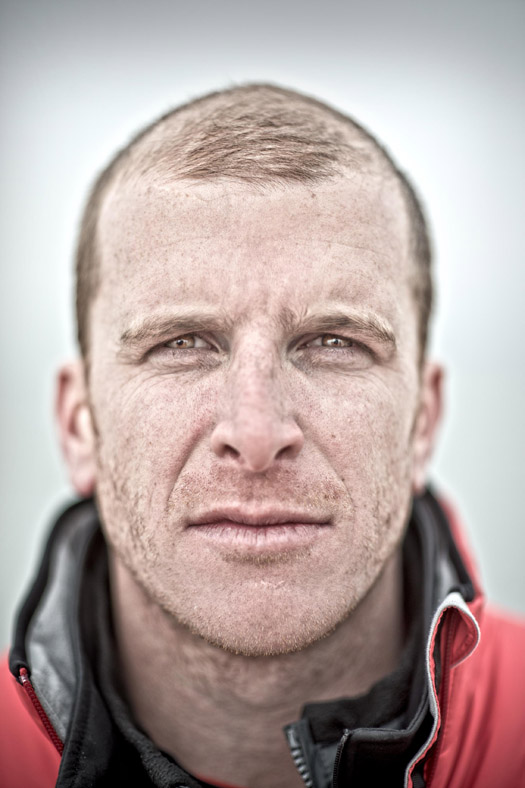
Vendee Globe bound – Sean McCarter of Lough Swilly
The Vendée Globe is a round-the-world single-handed yacht race, sailed non-stop and without assistance. The race was founded by Philippe Jeantot in 1989, and since 1992 has taken place every four years. The 2016-2017 edition is planned to start on Sunday, November 6, 2016.
As the only single-handed non-stop round-the-world race, the race is a serious test of individual endurance, and is regarded by many as the ultimate in ocean racing.
In January 2014, McCarter was awarded Afloat.ie's sailor of the month award for his performance as skipper of the Derry Londonderry yacht in the Clipper Round the World race.
McCarter has published a website for the race bid here
Clipper Race Fleet Competing In Honour Of Lost Crew Member
Close competitive racing in the first leg of the Clipper Round the World Yacht Race from London to Rio has been overshadowed this week by the death of a crew member in what appears to be a tragic accident.
Andy Ashman, a paramedic from South East London was an experienced sailor and described as being typical of the 'Corinthian' Clipper Race spirit. He was an inspiration to the rest of his team of amateur sailors from all walks of life.
While the team aboard IchorCoal went ashore at Porto, in northern Portugal, the Clipper Race fleet paid their respects, flew their Red Ensigns at half mast, and raced on as the most fitting tribute.
At the front of the fleet the duel continued between GREAT Britain and LMAX Exchange. But the two have now split with LMAX Exchange taking a clear lead of more than 160 nautical miles closer to the finish in Rio after taking better winds further east, racing through the Canary Islands and then close to the West Saharan coast.
The leaderboard has seen some considerable changes over the last 24 hours, as the teams made their tactical decisions on whether to pass between the Canary Islands and take more of an inshore route, or leave them to port.
As a lasting tribute the Atlantic Ocean Sprint, a short section of the race track off the Brazilian coast where extra points are awarded for the fastest team between two points, will be named in Andy's honour. The fastest team will receive a special trophy, the 'Andy Ashman Memorial Plate' in Rio and it will continue to be awarded in future editions of the Clipper Race.
As at 1400 UTC (1500 UK/BST) the fleet positions were as follows:
1. LMAX Exchange - 3542 nm to finish
2. GREAT Britain
3. Derry~Londonderry~Doire
4. Garmin
5. Qingdao
6. Da Nang - Viet Nam
7. ClipperTelemed
8. Unicef
9. PSP Logistics
10. Visit Seattle
11. + Mission Performance
12. IchorCoal
#Clipper - Mayor of Derry City and Strabane District Council Elisha McCallion joined Clipper Round the World Yacht Race founder and chairman Sir Robin Knox-Johnston earlier today (Friday 1 May) for the naming ceremony of the Derry-Londonderry-Doire yacht entry in the 2015-16 edition.
The ceremony at the race’s Gosport headquarters in Portsmouth Harbour also saw the yacht's skipper named as 31-year-old Daniel Smith from Scotland.
Smith is an experienced yachtsman and instructor and will lead the team on its 40,000-mile, 11-month ocean race series, which gets underway on Sunday 30 August from London.
Today's event was also attended by the four winners of the council’s ‘Your Next Chapter’ bursary scheme.
Jilly St John, David Pollock, Keelin O’Kane and Conor Shortland start their race training tonight and will each sail a leg of the Clipper 2015-16 Race aboard Derry-Londonderry-Doire.
“They are all about to embark on a journey that will change their lives," said Sir Robin. "I founded the Clipper Race in 1996 to give people the chance to sail around the world, experience the wonders and challenges of Mother Nature, and the satisfaction that comes from the achievement of crossing the world’s oceans.
“As the bursary winners begin their four weeks of race training, they will be tested like never before but the confidence and skills they will glean from the experience will stand by them for the rest of their lives and provide them with unforgettable memories.”
Derry-Londonderry will be a host port for the third consecutive time and will welcome the whole Clipper Race fleet after its final Atlantic Ocean crossing next summer.
Mayor McCallion said she was happy to be part of the naming ceremony and to meet the skipper.
“The city and district is hugely excited to be participating in the Clipper 2015-16 Race and to welcoming the race back to the city next summer," she said.
“The LegenDerry Maritime Festival was a significant celebration for us, it captivated our entire city and left a lasting legacy. We are very pleased to have skipper Daniel Smith on our team and delighted that he will be involved in the training of our four local bursary scheme winners.”
Smith is taking a career break from his role as senior yachting and Watersports Instructor for SportScotland’s National Centre at Cumbrae to lead his amateur crew around the world.
Speaking about his appointment for the first time, he said: “I’m really excited to be named the Derry-Londonderry-Doire skipper. There are strong sailing links between Scotland and Northern Ireland and that is a relationship we hope to share with our international crew as we sail around the world.
“I’ve heard that there is always a warm welcome in Derry-Londonderry for the Clipper Race fleet and I’m already looking forward to sailing up the River Foyle in front of the home crowd.
"It’s also great that I will be taking Jilly, Keelin, David and Conor for their level-one training this week because it means we have got lots of time to get to know each other too."
The ‘Your Next Chapter’ bursary scheme was open to people aged 18 and over who are currently unemployed, participating in an employability programme, or in receipt of benefits, and living in the Derry City and Strabane District Council area.
It follows the success of a previous bursary project organised by Derry City Council in partnership with the Clipper Race in 2011-12 in which four out of the five participants secured full-time employment through Derry City Council’s KickStart to Work Intermediary Labour Market Programme.
The Clipper 2015-16 Race marks the tenth edition of the world famous event. It sets sail from London on 30 August 2015 and will visit the Foyleside city next summer, marking its third team entry and hosting of the international sporting competition.
Sail Ireland's North–West Coast to Derry
#visitderry – Sail Ireland's North West and discover Donegal's rugged coastline and the River Foyle to the walled city of Derry~Londonderry, named by 'Lonely Planet' as one of the Top 10 Cities to visit in the World!
Follow the seaways from Scotland, England and Wales and, with good planning, the tidal streams will make light work of the passage across the North Channel and westward to the Foyle. Lying in wait is the fantastic coastline of Inishowen, with vistas of towering stacks, cliffs, beaches and a repertoire of heritage!
Sailing along the top of Ireland, take advantage of the sheltered delights of Lough Foyle and, at its mouth, the quaint village of Greencastle, the second-biggest fishing port in Donegal.
The harbour accommodates a wide range of yachts and a new permanent pontoon is planned for 2015. Trawlers from here ply as far as Rockall and the local mussel and oyster harvests supply restaurants across the region. Greencastle itself is home to a superb seafood eatery and its traditional Irish pubs are perfect places to relax and enjoy the 'craic' in this friendly village.
Visitors can also avail of a stunning shoreside walk and check out the Inishowen Maritime Museum – housed in the Coastguard buildings overlooking the harbour. Lough Foyle is shallow but a well-marked shipping channel runs all the way from Greencastle to Derry~ Londonderry's Foyle Marina, where two pontoons can berth up to 120 boats.
Named by acclaimed travel publication 'Lonely Planet' as a Top 10 City in the World, Derry is renowned as one of the finest walled cities in Europe and the defences celebrated their 400th anniversary in 2013 during Derry's iconic year as the inaugural UK City of Culture.
Take a trip back in time strolling along the famous 17th Century walls, and view one of the largest collections of original cannon in Europe, dating back to the days of the Siege. Or why not call in to one of the many museums and immerse yourself in the city's quirky history?
A hard day shopping and sightseeing is guaranteed to work up an appetite and whether you're looking for contemporary cuisine, a fine dining experience or somewhere to re-fuel the kids, you'll find it all here.
So where to next? Derry is home to a thriving music scene and the city is packed with lively bars, stylish clubs and traditional pubs.
Join the locals in an Irish trad 'seisiun' or catch a gig at one of Derry's cutting-edge music venues. Or why not check out one of the city's many events? Visit Derry recommends the City of Derry Jazz from April 30 to May 1 (cityofderryjazzfestival.com), and Flavours of the Foyle Seafood Festival (25-26 July).
Just minutes from Derry lies the stunning landscape of Donegal. Take a drive around its rugged coastline and marvel at endless beaches, medieval castles and natural wildlife. Challenge yourself and try your hand at angling, cycling, hiking or surfing. And let's not forget some of Ireland's finest links courses!
To the east of the city you will find the stunning natural hinterland of the North Antrim Coast. Explore the Giant's Causeway, a UNESCO World Heritage Site, and take an 'Indiana Jones' style walk across the famous Carrick-A-Rede rope bridge, which is suspended over 100ft between two rugged cliffs – an experience that is definitely not for the faint hearted!
To finish your day, call into Bushmills Distillery for a drop of Northern Ireland's most famous exports, Bushmills whiskey.
On the doorstep of such stunning scenery, Derry~ Londonderry has to be one of Europe's greatest city experiences. With berthing fees from just £15 per night there really is no better time to visit. Make your next sail the North West of Ireland – it'll be 'LegenDerry'!
'The North West is among the most beautiful cruising grounds in the world'
During the Clipper Round the World Yacht Race, the Derry~Londonderry stop–over was the best; not just from my slightly biased point of view, but also one shared by most of the crew on the other boats. The reception after the scenic trip up the Foyle into such a vibrant and friendly city is what made it so special. The facilities in the new Foyle Marina and also nearby in Greencastle, Co Donegal are fantastic. It's great to see the development going into the port as it and the surrounding areas in the North West of Ireland are among the most beautiful cruising grounds in the world... especially when the sun shines!
Derry~Londonderry skipper Sean McCarter
DATE FOR YOUR DIARY!
The Clipper Round the World Yacht Race and Maritime Festival returns to the city – in Summer 2016!
Now firmly established as the No 1 stop–over destination on the Clipper Race circuit, Derry will host a week-long Maritime Festival to celebrate the arrival of this iconic race. Foyle Marina will transform into a summer promenade, complete with race village, marine marquees, award winning continental market and host of sea-faring activities on and off shore. At the centre of the festival will be the welcome of the 12-strong fleet of Clipper yachts, including Derry~Londonderry-Doire yacht. In 2014, the city welcomed more than 120 visiting yachts during the festival – make sure you are part of the celebrations next year!
Book your berth now!
Contact FOYLE Port
+44 (0) 28 7186 0555
#clipper – 25 Days to Go!.. Richard Fearon of Lough Swilly Yacht Club is getting excited about the homecoming of the Clipper Round the World Yacht Race during the Legenderry Maritime Festival in Derry from 21-29 June. Richie himself skippered one of the Clipper Yachts in the 2009-10, 40,000 mile race.
The fleet of twelve 70ft Clipper ocean racers will arrive beneath the Foyle Bridge from Saturday 21st June for the week-long festival in Derry~Londonderry, before setting off on their final race leg from Greencastle Co Donegal on Sunday 29th June, along with a stunning display from the RAF Red Arrows. Richard is pictured with Anna Dalton and Meghann McKeever.
Legenderry Maritime Festival website here



























